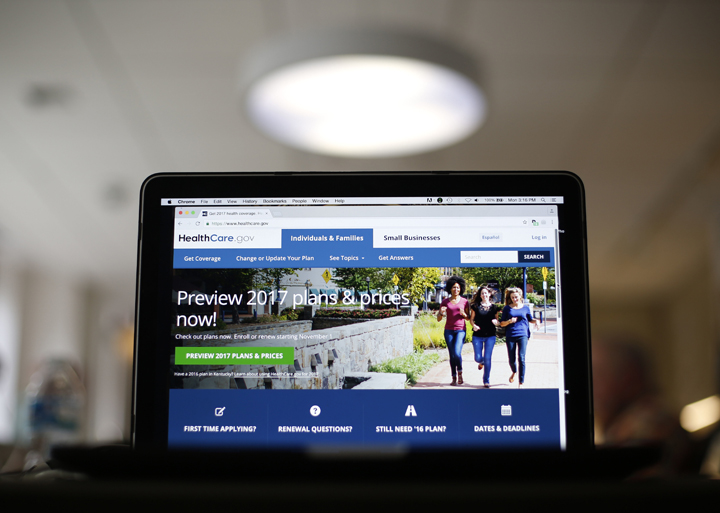WASHINGTON — Americans in the health insurance markets created by President Barack Obama’s law will have less choice next year than any time since the program started, a new county-level analysis for The Associated Press has found.
The analysis by AP and consulting firm Avalere Health found that about one-third of U.S. counties will have only one health marketplace insurer next year. That’s more than 1,000 counties in 26 states — roughly double the number of counties in 2014, the first year of coverage through the program.
With insurance notices for 2017 in the mail, families are already facing difficult choices, even weighing whether to stay covered.
“At this point we are at a loss,” said Ryan Robinson of Phoenix. “We don’t know what the next step is.” He and his wife, Nicole, only have plans from one insurer available next year, and the company doesn’t appear to cover an expensive immune-system medication for their 11-year-old daughter.
Phoenix is the market hardest hit by insurer exits, shrinking from nine carriers to one. With many other communities affected, however, the problem of dwindling choice may create even bigger political headaches than the rising premiums announced earlier this week.
Largely as a result of the Affordable Care Act, the nation’s uninsured rate has dropped to a historically low level, less than 9 percent. But the program hasn’t yet found stable footing, and it remains politically divisive. Insurer participation rose in 2015 and 2016, only to plunge.
Dwindling choice could be a trickier issue than rising premiums for the Obama administration and advocates of the 2010 law, including Democratic presidential candidate Hillary Clinton.
Most customers get financial assistance, and their subsidies are designed to rise along with premiums, which are increasing an average of 25 percent in states served by HealthCare.gov. But there is no comparable safety valve for disruptions caused by insurers bailing out.
“Rising premiums get all of the political attention, but lack of choice between insurers could be a bigger problem for consumers,” said Caroline Pearson, a senior vice president with Avalere.
Five states — Alaska, Alabama, Oklahoma, South Carolina and Wyoming — have one participating insurer across their entire jurisdictions. Only Wyoming had faced that predicament this year.
Another eight states — Arizona, Florida, Georgia, Missouri, Mississippi, North Carolina, Nevada and Tennessee— have only one participating insurer in a majority of counties.
Citing big financial losses, several marquee insurers sharply scaled back their participation for next year. United Healthcare exited from more than 1,800 counties, and maintains only a minuscule presence, according to the analysis. Humana nearly halved the number of counties where it offers plans.
Insurers say enrollment was disappointing, patients were sicker than expected, and an internal system to help stabilize premiums didn’t work well. The Obama administration says insurers are correcting for initially pricing their plans too low.
HealthCare.gov has taken steps to help consumers whose insurer is leaving by matching them to the closest comparable plan on the marketplace next year.
Administration officials also point out that many private employers offer workers just one plan.
The upheaval in the health insurance markets has consumers scrambling to figure out options. Sign-up season starts Nov. 1 and ends Jan. 31.
South of Minneapolis, in Goodhue County, Minnesota, farmer Eugene Betcher said his Blue Cross Blue Shield family plan is going away. The insurer is dropping its popular preferred provider plan, which covers more than 100,000 area residents.
Betcher has an appointment with his insurance adviser, but he expects sharply higher premiums and having to switch doctors.
In his early 60s, he’s mulling just keeping his wife on the plan. “I’m thinking of not covering myself and hoping to get to 65 and Medicare,” said Betcher. He’d risk a fine, but he says that financially he would probably come out ahead even if he had to pay out of pocket for medical care.
In Birmingham, Alabama, property insurance adjuster Jacob Bodden said his Humana plan is pulling out and Blue Cross Blue Shield remains his only option. He gets no subsidy from the government, so he’d have to cover the entire premium increase himself.
“I don’t trust the incompetents who created this mess can fix it,” Bodden said.
In Phoenix, Ryan and Nicole Robinson are at the epicenter of the health law’s latest troubles. Maricopa County has seen the most insurers bail out, and premiums for a benchmark plan are spiking 145 percent next year, beyond any other major market on HealthCare.gov.
Ryan Robinson, who works in sales for an out-of-state health care company, said the family’s premium will go from $821 to $1,489. It’s more than their mortgage and they don’t qualify for an income-based subsidy.
But what the Robinsons most worry about is that neither of their daughter’s two medications appears to be covered by the remaining insurer. That includes an immune-system drug costing about $5,000 a month.
“I shouldn’t be getting government assistance, but I shouldn’t be offered a plan that’s ludicrous,” said Ryan Robinson. He says the idea behind the law “was good and principled,” but “there have got to be other solutions out there.”
The Obama administration says consumers in such situations can seek an exception. “The law guarantees access to necessary prescriptions, even if they aren’t on a formulary, through an exceptions process,” said spokesman Aaron Albright.
Avalere is a consulting and data-crunching firm that provides nonpartisan analysis for health care industry and government clients. It compiled insurance marketplace data from 49 states and the District of Columbia for the analysis. That represents markets in 3,129 counties, where 12.3 million people selected plans for 2016. Only Massachusetts was unable to provide 2017 data by this week.

